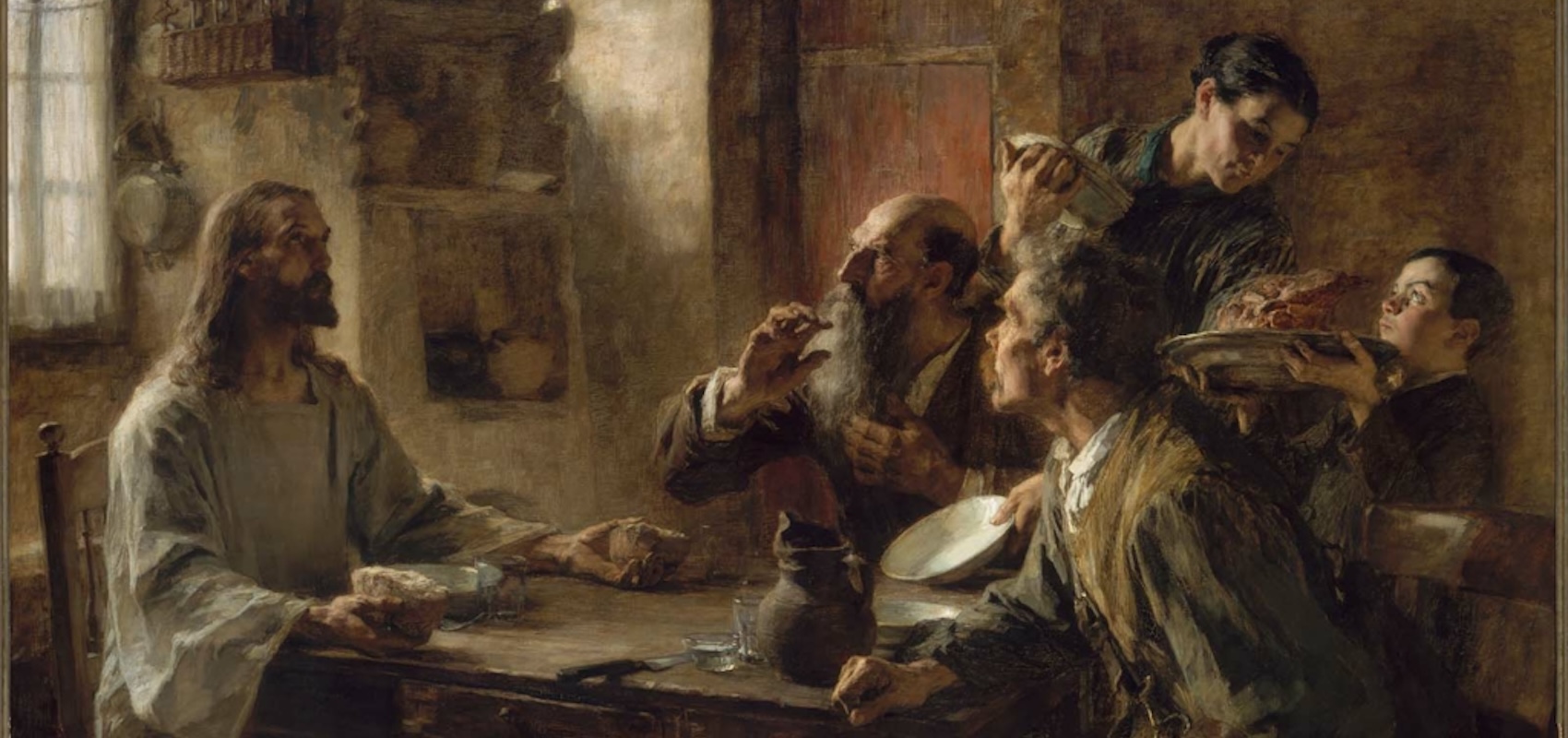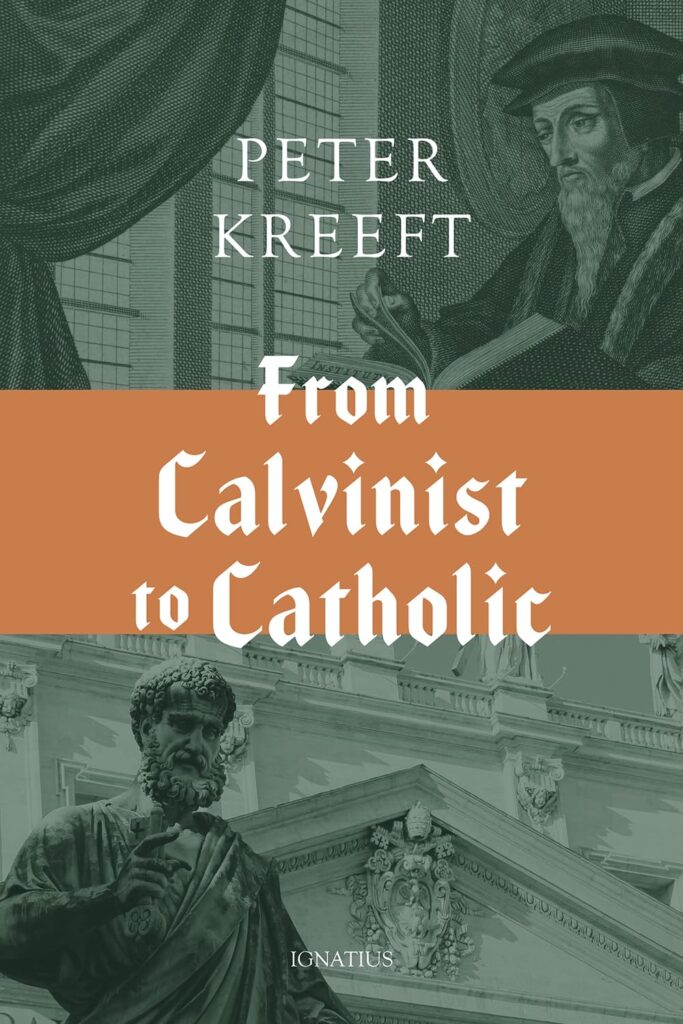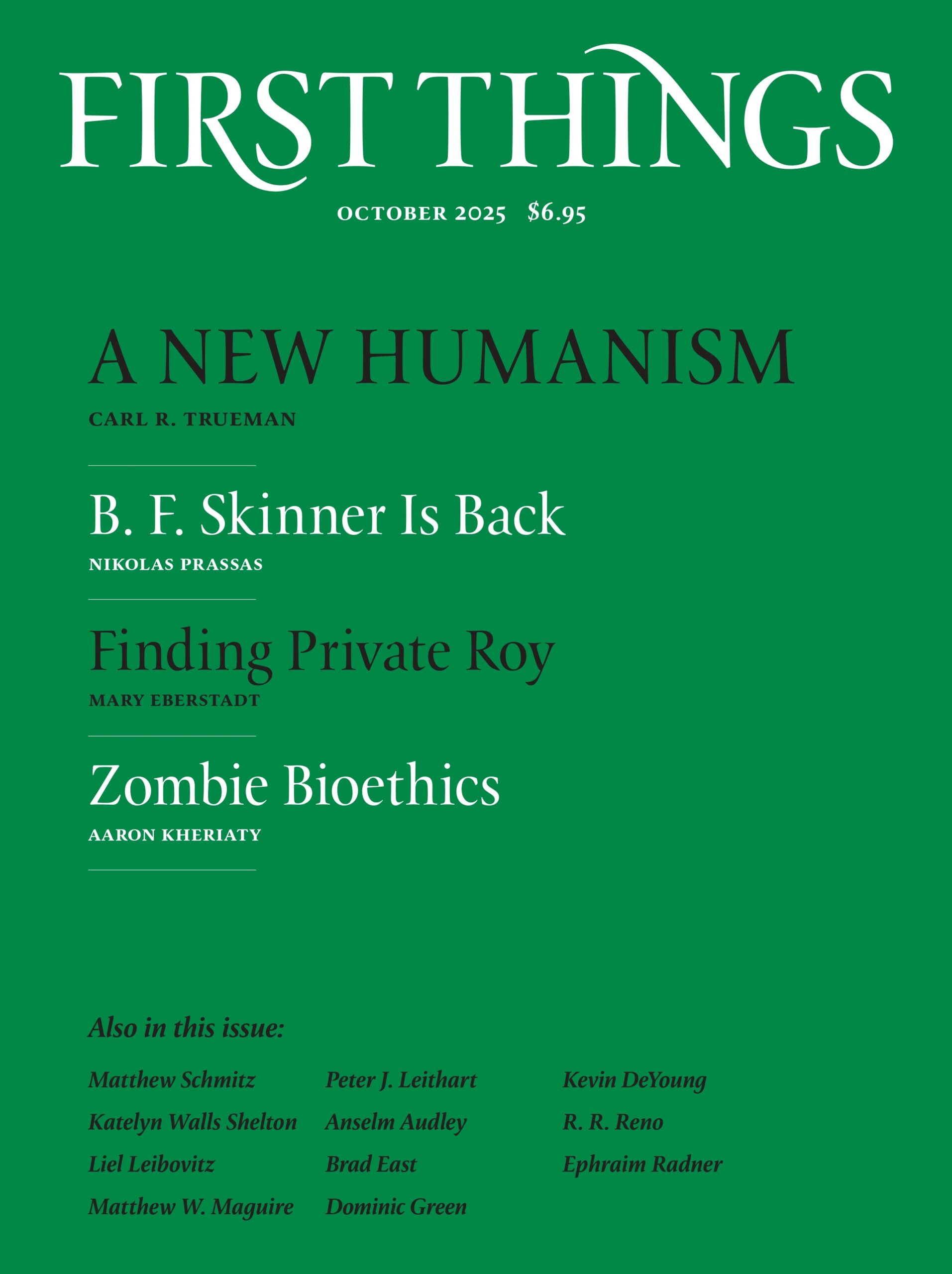
From Calvinist to Catholic
by peter kreeft
ignatius, 192 pages, $21.95
Not many people need to write an autobiography—especially not philosophy professors. Not many people who take the time to write an autobiography will do so in under 200 pages. But Peter Kreeft is unlike most people (and most philosophy professors).
For starters, there is his sheer output: more than one hundred books, covering everything from apologetics to surfing to Socrates to C. S. Lewis to the Catholic Catechism. Even more impressive is how he writes: pithy, humorous, opinionated, insightful, good-natured, and playful, yet serious and logical. Since Kreeft loves lists, permit me to list seven of my favorite lines from the book.

On the freewheeling way of being a kid in the 1940s: “Our play had more freedom, and our work and thought had more order.”
On young people today: “Teenagers are borderline human beings with their brains not in their heads but in their hormones or their smartphones; confused know-it-alls, dogmatically skeptical; spoiled brats who see their free gift of education as an imposed prison sentence. That is an exaggeration and a joke, of course, but if it weren’t at least 49 percent true, it wouldn’t be funny at all.”
On the frugality of the Dutch: “Dutch Calvinists make Scotchmen look like wasteful profligates. . . . How can you tell a Dutch house? By the paper plates on the clothesline.”
On the vacuity of modern praise choruses: “They make me feel excruciatingly embarrassed, as if I were watching a nudist colony of drunk Neanderthals loudly ‘sharing their feelings’ about their feelings. Yes, I know the people who sing them are sincere. They are terribly sincere. So is Ned Flanders.”
On what atheists do not see: “Religion is indeed a crutch, as the atheists argue. And until the atheist confesses that he is a cripple, he will not be in the market for a crutch.”
On the ubiquity of DEI in higher education: “Yes, I am a critic of the ‘diversity, equity, and inclusion’ police, because I believe in all three of these things and they do not, any more than Robespierre and the ‘reign of terror’ in the French Revolution believed in ‘liberty, equality, and fraternity’ as they claimed they did.”
On why his autobiography says nothing about politics: “Today the majority of scholars, sociologists, psychologists, anthropologists, and journalists see politics as more powerful, more practical, more realistic, more true, and more important than religion, while those who actually believe what their religion teaches (whether it’s Christianity or another religion) must see things in the opposite way: that our politics is only our human invention and fashion . . . Therefore, when religion lets itself be influenced by politics, it always gets corrupted, while when politics lets itself be influenced by religion, it gets sanctified.”
Like I said, the man knows how to write.
The course of Kreeft’s life is not hard to trace. Born in 1937 into a loving home in Paterson, New Jersey, Kreeft learned Christianity from his parents and from his pastor in the Reformed Church in America. In 1955, he traveled west to attend Calvin College in Grand Rapids, Michigan. There he began his conversion—as the title indicates—from Calvinism to Catholicism. Almost the entire “autobiography” is the intellectual story of Kreeft’s conversion and an apologia for the Catholic faith. The rest of the story involves going to Yale, transferring to Fordham (where he completed his MA and PhD), marrying Maria, and then, in 1965, joining the faculty at Boston College, where he has lived and worked for sixty years. There is not much in this memoir about Kreeft’s personal life, especially as an adult—except for the general sense that—in the words of his biographical note—“He loves his five grandchildren, four children, one wife, one cat, and one God.”
As it happens, forty years after Kreeft was born and raised in the Reformed Church in America, so was I; and forty years after he left home to attend Calvin College, I left home to attend Calvin’s rival, Hope College—the RCA school in Holland, Michigan that Kreeft should have gone to! When Kreeft writes about the good and bad of tribal loyalty among the Dutch, the seriousness of Calvinist piety, and life in Grand Rapids, I know of what he speaks. Although we grew up two generations and seven hundred miles apart, we had many of the same cultural experiences: “Everyone I knew was Dutch, frugal, conservative, and Republican.”
But of course, our stories diverge in one absolutely fundamental way. My story has not been from Calvinist to Catholic but, one might say, from Calvinist to more Calvinist. As a Presbyterian pastor, I am not convinced by Kreeft’s apologetics for papal supremacy, or apostolic succession, or Marian devotion, or sacerdotalism, or Purgatory, or indulgences, or a Tridentine interpretation of justification, or a dozen other aspects of Catholicism, for which he argues with admirable brevity and lucidity. If a man is to be a Catholic, however, I hope he is the Peter Kreeft kind—full of good cheer and with a Protestant-like appreciation for the Bible, a personal relationship with Jesus, and the need for grace (even if we disagree on the nature of that grace).
Obviously, this is not the place to reengage the many areas where Catholics and Protestants continue to differ. But since most of the book is about Kreeft’s journey from Calvinist to Catholic, I think a few reflections are in order. Let me start with the area where he lands the best punches.
As is often the case when Protestants swim the Tiber, Kreeft’s initial attraction to the Catholic Church came by way of beauty and mystery. For Kreeft, this movement began with seeing St. Patrick’s Cathedral and reading St. John of the Cross. “My heart started moving down the road to Rome earlier than my head,” he writes. Kreeft found the poetry of the liturgy to be like fine wine, satisfying a deep thirst for joy and beauty. His aesthetic sensibilities resonated with architecture that was expansive and romantic rather than frugal and utilitarian. Whereas Calvinist churches were plain, humble, homely, and unpretentious, Catholic cathedrals felt elaborate, spectacular, and otherworldly. The eventual move to Catholicism was not a change from barrenness to pregnancy, he insists, but from appetizers to a main course. In Kreeft’s telling, Catholicism gave him the “more” he did not know he was missing.
One does not have to agree with all of the “more” to accept that Kreeft has identified a real weakness in many strains of Protestantism (and of evangelicalism in particular). I love the Puritans and their emphasis on the word over spectacle and their concern for the “beauty of holiness,” but more than a few low-church Protestants almost wear their utilitarian aesthetic as a badge of honor. Too many of us consider ill-prepared, poorly crafted spontaneous prayers the only way to be sure the Spirit is at work. Kreeft is right to remind us that personal prayers may be precious to God, but they are not public liturgy. As Protestants, we would do well to think more deeply about how formality, tradition, structure, and space are critical supports in our commitment to worshiping a God who is high and lifted up and whose glory is beyond tracing out.
If transcendence, beauty, and mystery are Kreeft’s most compelling points for me as a Protestant, what about some of his less convincing arguments? Let me mention three.
First, I wonder whether Kreeft has rejected a caricature of Calvinism instead of the real thing. For example, he makes much of the fact that in Catholic theology, grace perfects nature. This is said to be a major weakness of Protestant theology. But it does not have to be. The great Dutch theologian Herman Bavinck anchored his whole Neo-Calvinist project in the conviction that grace restores nature. The same idea can be found in Francis Turretin and in many other Reformed systematicians.
Similarly, I am not convinced that Kreeft has dealt fairly with Calvin’s doctrine of free will. Kreeft believes strongly in God’s providential supervision over all things. He rejoices to know that God is the author of all our stories. He loves Romans 8:28 as a “castle keep” against doubt and despair. He stresses the importance of divine sovereignty. He also argues that Calvin was so “rationalistic” that he denied the other half of the great mystery: that we have free will even as God is sovereign. “If we are not free,” Kreeft argues, “then all morality and all justice is meaningless.” But this confuses several kinds of free will. Though Calvin denied that our wills, bound by sin, were free to choose salvation apart from God’s sovereign grace, he did not deny that we make real choices. Calvin preferred not to call this prerogative “free will,” but he granted that freedom from necessity “so inheres in man by nature that it cannot be possibly taken away.” In Reformed theology, God must unilaterally cause us to be born again, but he always works by renewing the will, not by abolishing it. As the Canons of Dort (one of the high statements of Reformed orthodoxy) put it, God “does not act in people as if they were blocks and stones,” nor does he “coerce a reluctant will by force.”
Second, I wonder whether Kreeft has dealt fairly with the diversity that existed in the Church even before the Reformation. He insists that not one of the supposed corruptions Protestants have found offensive and unbiblical—the primacy of the bishop of Rome, the Eucharist instead of the Bible as the center of worship, the real presence of Christ in the Eucharist, the Mass as a propitiatory sacrifice, devotion to the saints and to Mary, her immaculate conception and sinlessness, her assumption into heaven, the doctrine of purgatory, and baptism as a saving act that works ex opere operato—“ever caused any protest or controversy or appeared as new” for 1,500 years. “If the Catholic Church today is full of so many heretical barnacles,” he asks, “why did no one in the world, no saint or sage or prophet, ever notice them and protest until Luther and Calvin?” Surely, the presence of the Waldensians, the Lollards, and the Hussites, not to mention the many conflicts between East and West, the many disagreements among the medieval schoolmen, and the many divergent views propounded by the Church Fathers and ecumenical councils undermine such a protest-free version of Church history.
Three, I wonder whether my Catholic friends have considered what may be broken in Catholicism itself when most rank-and-file Catholics do not know the Bible and do not understand salvation by grace. This is not a criticism of Kreeft, so much as a different conclusion from the one he reaches. Kreeft presents an enjoyably evangelical version of Catholicism. And he does not describe his conversion as a rejection of Protestantism so much as a growing-up out of Protestantism into the adulthood of Catholicism. I suppose my question, then, is why it seems that so few Catholics grow into Kreeft’s version of Catholicism without the help of Protestantism.
Kreeft acknowledges that Protestants are superior to Catholics in three things: sermons, hymns, and familiarity with the Bible. Is it possible that the rejection of sola scriptura (the conviction that the Bible is the final and supreme authority on all matters of faith and practice) has meant, on a practical level, that Scripture is not deeply taught or emphasized in most Catholic congregations? If the word of God everywhere in the Bible forms the people of God, corrects the people of God, and tells the people of God who they are to be and what they are to do, then surely anything that leads the Church away from knowing, studying, and hearing that word is rightly regarded as suspect, even highly suspect.
In another moment of admirable candor, Kreeft acknowledges that when he has asked the Catholic students at Boston College why God should admit them into heaven, more than 90 percent begin with “I” statements like “I did my best” or “I am a kind person.” According to Kreeft, about half mention God’s mercy, and fewer than 10 percent mention Christ. Even if I were convinced that all the “more” of Catholicism was correct, I would have to wonder whether the benefits of the “more” had swallowed up the most important things that should come first. What does it profit a man to gain all the cathedrals of Europe if he forfeits his own soul?
At one point, Kreeft says he personally knows of at least twenty people who have converted from Calvinism to Catholicism, but not one who converted from Catholicism to Calvinism. All the data point in a different direction. Catholicism in America continues to decline, at a slightly faster rate than evangelical Protestantism. (My conservative Presbyterian denomination is one of the few that is growing.) In twenty-three years as a pastor, I have seen literally hundreds of people come into the Calvinist fold from a Catholic background. Usually, the first thing they mention is that they never heard the gospel clearly in the Catholic Church and that they thought the essence of Christianity was about being a good person. Maybe they did not have ears to hear what was there in the Catholic liturgy or in the weekly homily. But it is at least worth considering why those who grow up with all the “more” of Catholicism often know little of the Bible and are routinely unaware that God saves sinners by grace through faith, and that this is the gift of God, not a result of works, so that no one may boast (Eph. 2:8–9).
Kreeft takes some big swipes at Calvinism throughout the book. This is no mealy-mouthed apologetics. And yet, even when I disagreed (strongly at times), it was impossible not to like the apologist. It is easy for people who believe strongly in their views to pursue their cause with scorn, with monomaniacal focus and self-importance. Kreeft has none of these attributes. Instead, he is always self-aware and self-deprecating. He admits that he is better at reading and writing than at pastoring. He acknowledges that he hates small talk, which he has come to realize is a fault, not a virtue. He confesses that he is too often weak-willed, self-indulgent, and a whiney complainer. There is an important lesson here for polemical writers of all ages and on all topics. If you are determined to correct others, demonstrate that you are even more determined to correct yourself.
Wisdom doesn’t always come with age, but when the already wise get older, their wisdom is especially sanguine. I am still thinking about some of the pithy sayings at the end of the book—such as “I have learned to expect less of people.” And “I have learned the fragility of reason as well as the blindness of emotion.” And “I have learned the necessity of suffering and sorrow in order to know God and to become holy.” These are simple truths, but also profound. And there are many more like these.
I am thankful that Peter Kreeft has spent his career arguing for the reasonableness of Christianity. I am thankful that after all these years he still loves the first question-and-answer from the Heidelberg Catechism. Most of all, I am thankful that he loves Jesus and wants others to love Jesus. I do not agree with the Roman Catholic faith. In fact, I think it represents a serious and dangerous departure in many places from the truths of Scripture. No doubt, Kreeft thinks my theological errors are serious as well. So if we ever meet, I suppose our conversation will take as its point of departure the saying that came to describe the relationship between him and his Calvinist father: “Hate the heresy but love the heretic.”
The Church’s Answer to the World (ft. Carter Griffin)
In the latest installment of the ongoing interview series with contributing editor Mark Bauerlein, Fr. Carter Griffin…
The Lost Art of Saying “No”
Conservative pundit Matt Walsh recently contended that “we have to recapture the long-lost art of saying ‘no.’”…
Undermining the Church’s Public Witness
Bishop Thomas J. Paprocki recently wrote in these pages that the Archdiocese of Chicago’s plan to grant…

